Genetic testing has become more accessible in recent years. People can now order DNA tests directly without going through a doctor. These direct-to-consumer genetic tests analyze a person’s genes to provide health information. Some tests focus on how genes affect nutrition and diet.
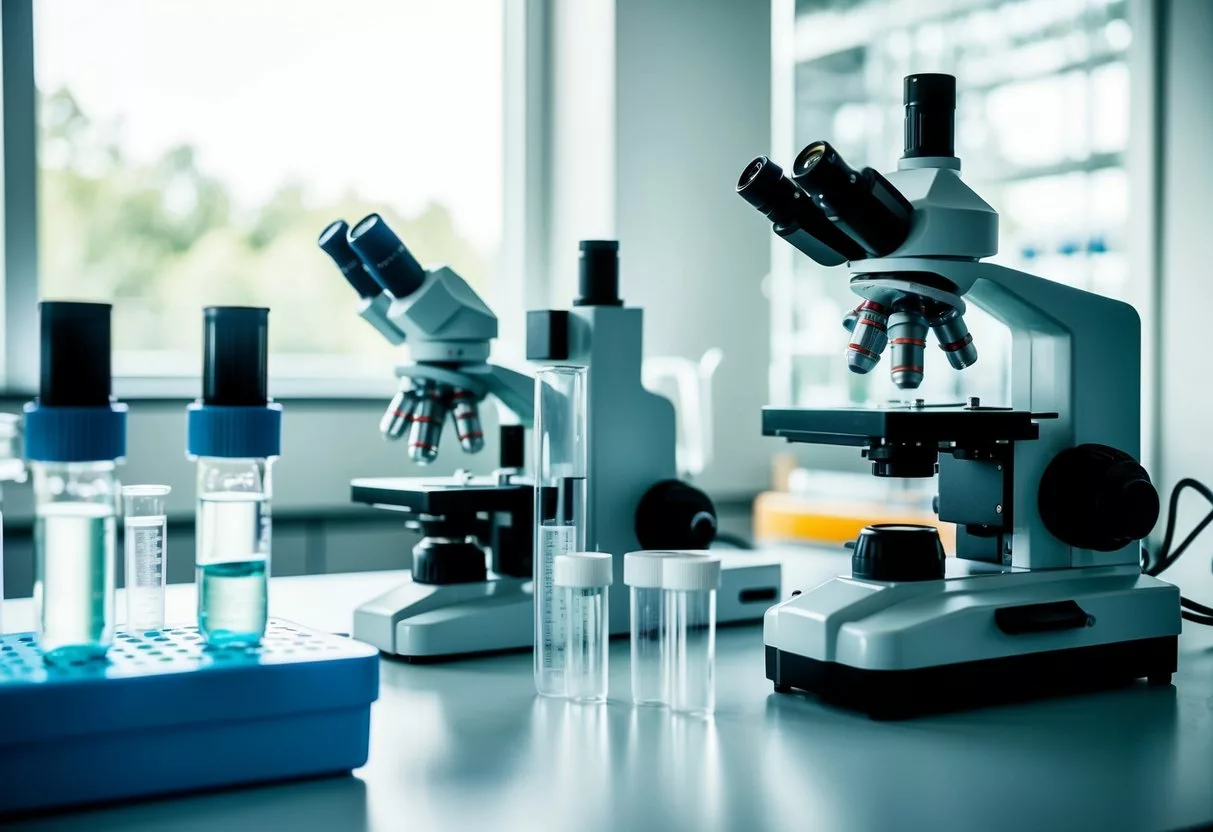
This field is called nutrigenomics. It looks at how genes influence how our bodies process food. Nutrigenomic tests aim to give personalized diet advice based on a person’s DNA. Companies claim these tests can help people eat better and avoid health problems.
Many see nutrigenomics as part of a shift toward personalized medicine. The idea is to tailor healthcare to each person’s unique genetic makeup. But some experts question if these consumer tests are ready for wide use. They worry about the accuracy of results and how people might use the information.
Understanding Nutrigenomics and Nutrigenetics
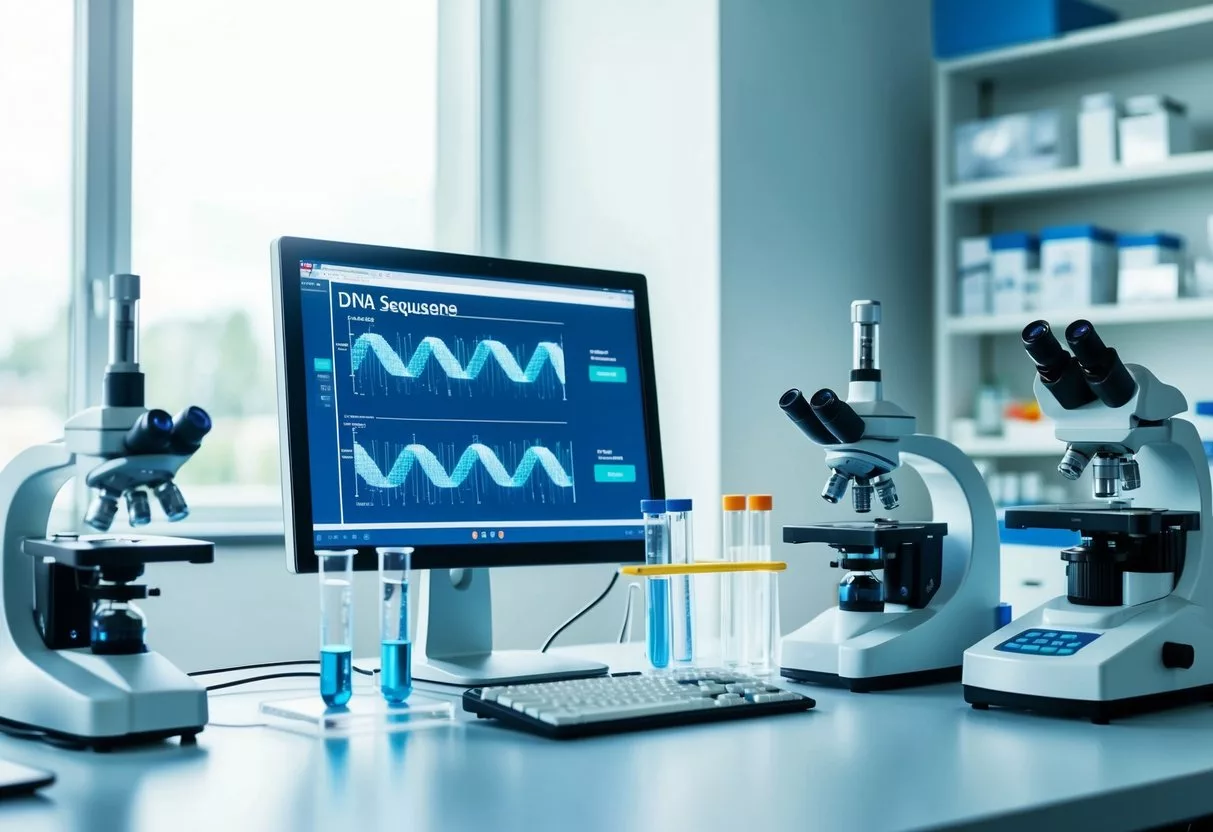
Nutrigenomics and nutrigenetics are two closely related fields that explore how our genes interact with the foods we eat. These areas of study aim to uncover how our genetic makeup influences our nutritional needs and responses to different diets.
The Science of Nutrigenomics
Nutrigenomics looks at how nutrients affect gene expression. It studies how the food we eat can turn genes on or off, changing how our bodies work. This field helps explain why some people react differently to the same foods.
Nutritional genomics research shows that certain nutrients can alter gene function. For example, some vitamins may help prevent diseases by changing how genes behave.
Scientists use advanced tools to study these effects:
- DNA sequencing
- Gene expression analysis
- Metabolic profiling
These methods help researchers see how diet affects our genes and health.
The Role of Nutrigenetics in Nutrition
Nutrigenetics focuses on how genetic variants affect how we process nutrients. It looks at why some people need more or less of certain nutrients based on their genes.
Key aspects of nutrigenetics include:
- Identifying genes linked to nutrient metabolism
- Studying how genetic differences affect dietary needs
- Developing personalized nutrition plans
Human genetic variation plays a big role in nutrigenetics. Small differences in our genes can lead to big changes in how we use nutrients. For instance, some people may need more vitamin C due to their genetic makeup.
Nutrigenetic tests can help find these differences. They look at specific genes to suggest dietary changes. This can lead to better health outcomes for individuals.
Direct-to-Consumer Genetic Testing Explained

Direct-to-consumer genetic testing lets people access their DNA information without a doctor. These tests have changed over time and now offer many options for learning about genetics and health.
Evolution of DTC-GT Services
Genetic testing started in labs for medical reasons. In the early 2000s, companies began selling DNA tests straight to consumers. At first, these tests looked at ancestry and a few health traits.
As technology got better, the tests could check more genes. Prices went down, making tests more popular. Now, millions of people have tried at-home DNA kits.
Today’s tests can tell about disease risks, carrier status, and even how your body might react to certain foods or exercise.
Types of Genetic Tests Available
DNA testing kits come in different types. Some focus on ancestry, tracing family roots across the world. Others look at health risks for conditions like cancer or heart disease.
There are also tests for:
- Carrier status of genetic disorders
- Traits like eye color or taste preferences
- How your body processes nutrients (nutrigenomics)
- Your response to certain medicines
Some companies offer all these in one test. Others specialize in specific areas. Consumers can choose based on what they want to learn about their genes.
Genetic Markers and Their Significance
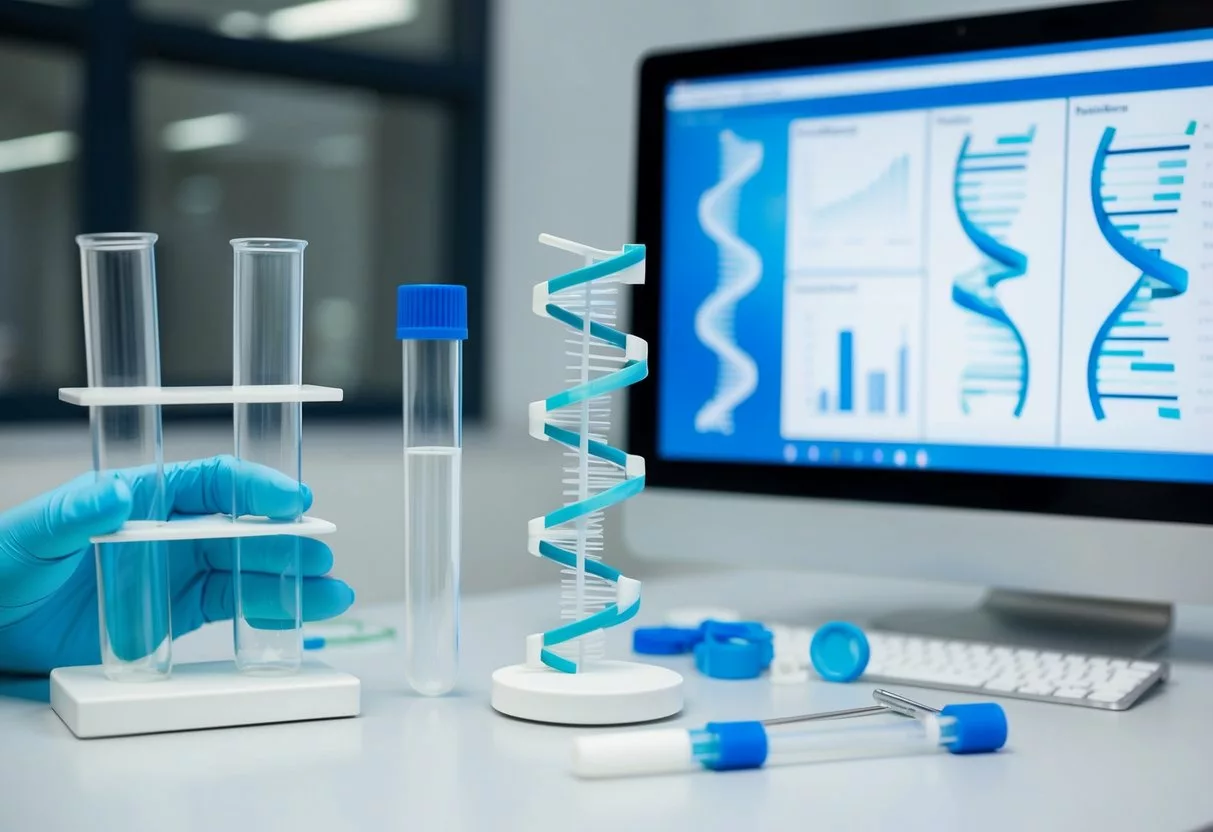
Genetic markers play a key role in nutrigenomics testing. These variations in DNA sequences can affect how our bodies process nutrients and respond to different diets.
Unpacking Single Nucleotide Polymorphisms (SNPs)
SNPs are the most common type of genetic marker used in nutrigenetic tests. They occur when a single DNA building block is changed.
For example, a SNP might change an A (adenine) to a G (guanine) at a specific spot in the genome. This small change can affect how genes work.
Some SNPs linked to nutrition include:
- rs9939609 in the FTO gene (associated with obesity risk)
- rs1801133 in the MTHFR gene (affects folate metabolism)
- rs4988235 in the MCM6 gene (linked to lactose intolerance)
These SNPs can influence how a person’s body handles certain nutrients or responds to different foods.
Understanding Insertions and Deletions (INDELs)
INDELs are another type of genetic marker. They involve extra DNA being inserted or removed from a sequence.
INDELs can be small (a few base pairs) or large (thousands of base pairs). They can have big effects on gene function.
In nutrigenomics, some important INDELs include:
- A 287-base pair deletion in the ACE gene (affects blood pressure response to salt)
- An insertion in the UGT1A1 gene (linked to how the body processes certain plant compounds)
INDELs can be harder to detect than SNPs, but they provide valuable info about genetic differences in nutrient processing.
The Role of Genomics in Complex Diseases

Genomics plays a crucial part in understanding complex diseases. It helps identify genetic factors that contribute to disease risk and progression. This knowledge can lead to better prevention strategies and treatments.
Cardiovascular Diseases and Genetic Predispositions
Cardiovascular diseases are a leading cause of death worldwide. Genetic factors play a significant role in their development.
Genome-wide association studies have identified many genetic variants linked to heart disease risk. These include genes involved in cholesterol metabolism and blood pressure regulation.
For example, variations in the APOE gene can affect cholesterol levels. This impacts the risk of coronary artery disease.
Some genetic tests can predict a person’s risk of developing heart problems. This information allows for early interventions and lifestyle changes.
Type 2 Diabetes and its Genetic Architecture
Type 2 diabetes is a complex metabolic disorder with a strong genetic component. It affects millions of people globally.
Over 400 genetic variants have been linked to type 2 diabetes risk. Many of these genes are involved in insulin production and glucose metabolism.
The TCF7L2 gene is one of the most important genetic factors. It affects insulin secretion and glucose levels.
Genetic testing can help identify people at high risk for type 2 diabetes. This allows for early prevention strategies, such as diet changes and increased physical activity.
Lactose Intolerance and Genetic Variability
Lactose intolerance is a common condition caused by the body’s inability to digest lactose, a sugar found in milk.
The LCT gene controls the production of lactase, the enzyme that breaks down lactose. Variations in this gene can lead to lactose intolerance.
In some populations, up to 90% of adults have lactose intolerance. This varies greatly between ethnic groups due to genetic differences.
Genetic testing can determine if a person is likely to develop lactose intolerance. This information can help individuals make informed dietary choices.
Understanding the genetic basis of lactose intolerance has led to the development of lactose-free dairy products. These products cater to people with this genetic variation.
Interpreting Genetic Test Results
Genetic test results for nutrigenomics can be complex. They require careful analysis to understand their meaning and potential impact on health and nutrition choices.
Managing Expectations and Limitations
Genetic tests provide information about a person’s genetic makeup, but they don’t tell the whole story. Many factors beyond genes affect health and nutrition needs.
It’s important to remember that:
- Test results are not diagnoses
- Genes are just one piece of the health puzzle
- Lifestyle and environment play big roles too
Genetic variants may increase or decrease risk for certain conditions. But having a variant doesn’t mean a person will definitely develop that condition.
Some nutrigenomic tests look at how genes might affect nutrient metabolism. These results can suggest personalized dietary advice. But they can’t predict exactly how a person will respond to specific foods or nutrients.
Actionable Insights and Health-Related Outcomes
Nutrigenomic test results can offer useful insights for making health choices. They may suggest:
- Foods to eat more or less of
- Nutrients that might need extra attention
- Potential sensitivities or intolerances
For example, a test might show a genetic variant linked to lactose intolerance. This could explain digestive issues and guide dietary changes.
Some tests look at how genes affect vitamin metabolism. Results might suggest taking certain supplements or eating specific foods rich in those vitamins.
It’s crucial to work with a healthcare professional when interpreting test results. They can help create a personalized plan based on genetic insights and other health factors.
Remember, genetics is just one tool for improving health. A balanced diet, regular exercise, and other healthy habits are still key for overall wellness.
Implications for Diet and Nutrition
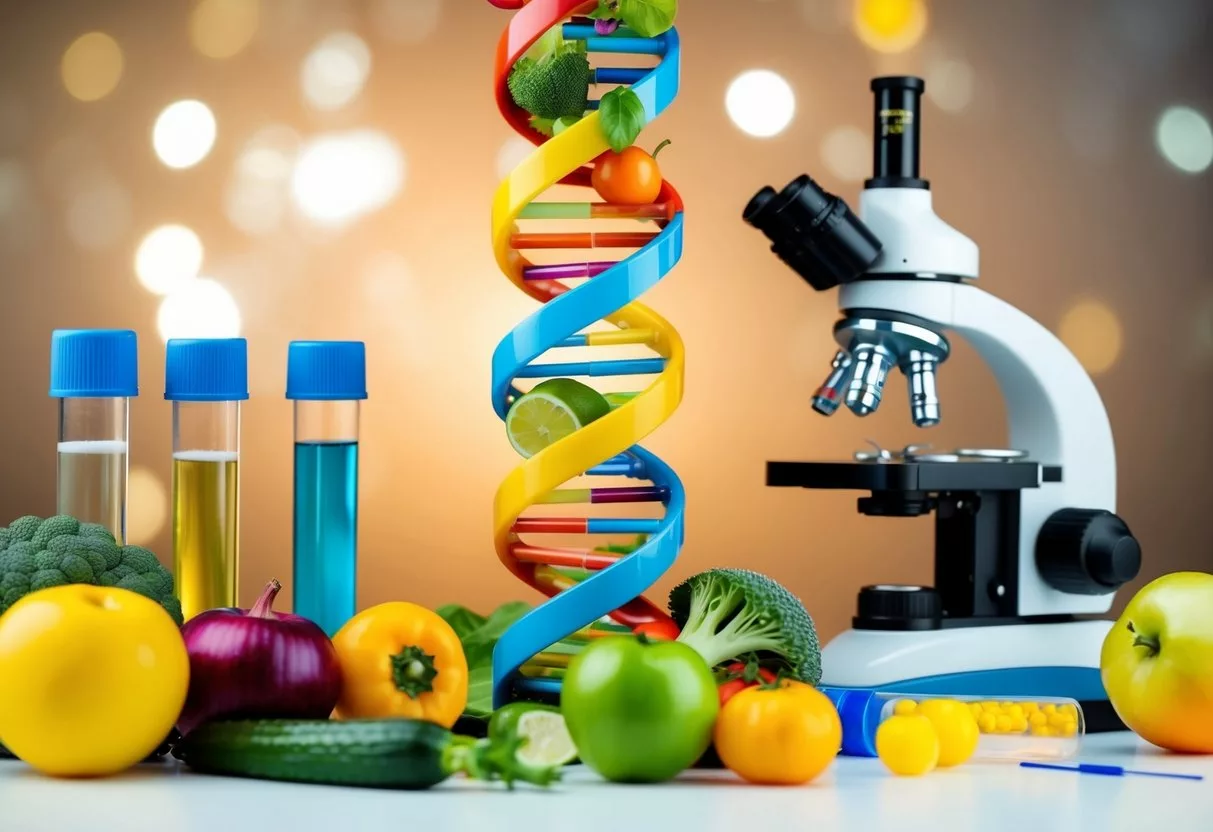
Direct-to-consumer genetic testing for nutrigenomics offers insights into how our genes affect nutrition. This information can help shape personalized eating plans and weight management strategies.
Tailoring Dietary Strategies
Nutrigenetic tests can reveal how a person’s genes influence their response to different foods. This knowledge allows for customized dietary advice.
For example, some people may have genes that make them more sensitive to caffeine. They might be advised to limit coffee intake.
Others may have genetic variations affecting how they process fats. Their diet plan could include specific types of healthy fats.
Nutrigenomics can also guide vitamin and mineral intake. A person’s genes might indicate they need more of certain nutrients like vitamin D or iron.
These personalized strategies aim to optimize health based on individual genetic makeup.
Nutrigenomic Approaches to Weight Management
Genetic testing can provide clues about a person’s predisposition to weight gain. This information helps in creating more effective weight management plans.
Some genes influence how the body stores and burns fat. Knowing this can guide choices about diet composition and exercise type.
For instance, certain genetic variants might respond better to low-fat diets, while others do well with low-carb approaches.
Nutrigenomics can also reveal information about appetite control and food cravings. This knowledge helps in developing strategies to manage hunger and food choices.
It’s important to note that genes are just one factor in weight management. Lifestyle, environment, and personal choices still play crucial roles.
Integrating DTC-GT Into Healthcare

Direct-to-consumer genetic testing (DTC-GT) is changing how we think about nutrition and health. It offers new ways to give people personalized diet advice based on their genes.
Clinical Recommendations and Precision Nutrition
Doctors are starting to use DTC-GT results to make better food and diet plans for patients. This is called precision nutrition. It looks at a person’s genes to figure out what foods might work best for them.
Some doctors now ask for genetic tests before giving diet advice. They use the results to suggest foods that match a patient’s genes. This can help prevent health problems.
But not all doctors agree on how to use these tests. Some think we need more research to be sure the advice really helps. Others worry that the tests might make people change their diets in ways that aren’t good for them.
Public Health Initiatives and Genetic Testing
Public health groups are looking at how to use DTC-GT to help more people. Some want to offer free genetic tests to learn about common health risks in different groups.
The UK Biobank is a big project that collects genetic data from many people. It helps scientists study how genes affect health and diet needs across large groups.
Some countries are thinking about adding genetic info to their food guidelines. This could help people choose foods that work better with their genes.
But there are worries about privacy and fairness. Not everyone can afford genetic tests. This could make it harder for some people to get personalized health advice.
Ethical and Privacy Considerations

Direct-to-consumer genetic testing for nutrigenomics raises important ethical and privacy issues. These tests deal with sensitive personal data that needs careful handling and protection.
Data Security and Consumer Privacy
Direct-to-consumer genetic tests offer benefits like better privacy and ease of access. But they also bring risks. Companies must protect genetic data from hackers and unauthorized use.
Many worry about genetic discrimination if test results get leaked. This could affect job prospects or insurance coverage. Strict laws are needed to prevent misuse of genetic information.
Some fear that marketing firms might get hold of genetic data. This could lead to targeted ads based on DNA. Clear rules must limit how companies can use and share genetic test results.
Informed Consent and Data Ownership
Getting proper informed consent is crucial for genetic testing. Consumers need to fully understand what they’re agreeing to before taking a test.
Test providers should explain in simple terms:
- What the test results mean
- How data will be stored and used
- Who can access the information
There’s debate over who owns genetic data. Some say it belongs to the person tested. Others argue companies have rights to anonymized data for research.
Consumers should know if their data may be sold or used for studies. They should have the power to opt out of research use if they choose.
Advancements in Research and Technology
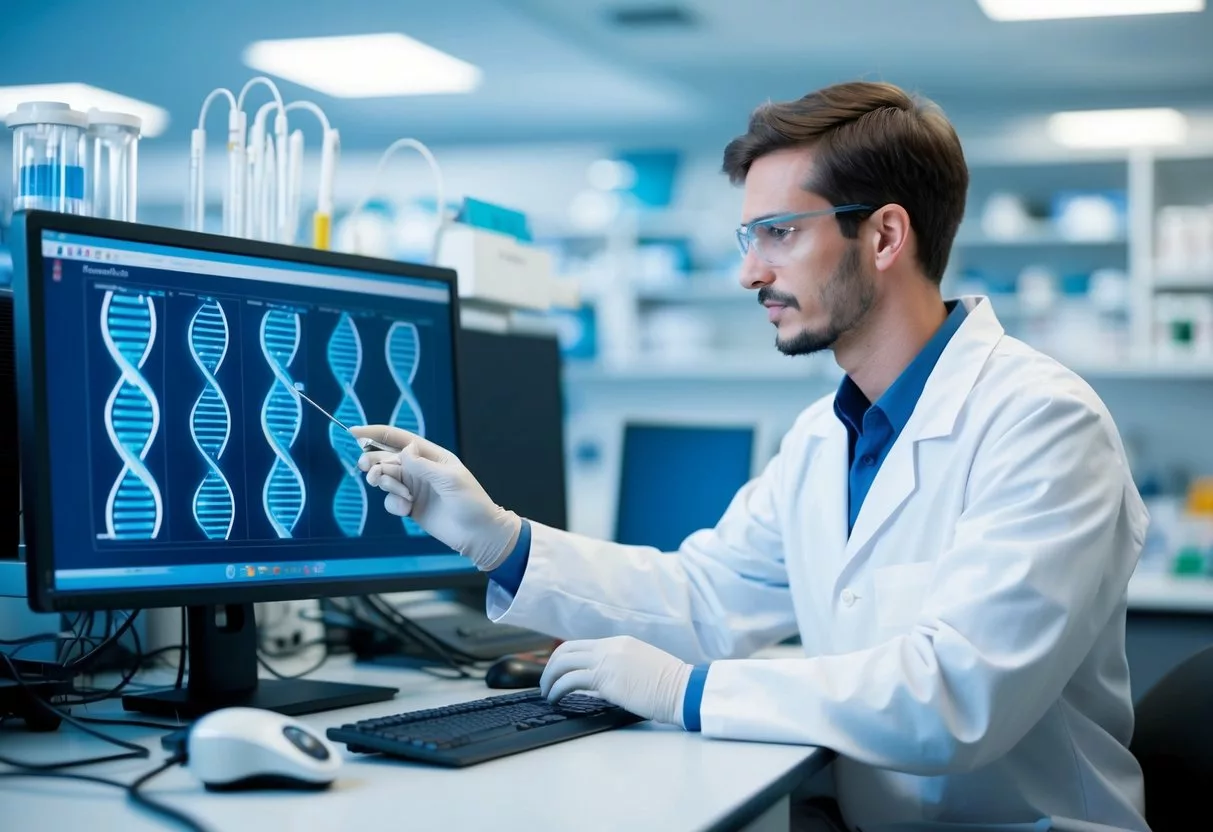
Genetic research has made huge strides in recent years. New tools let scientists study how genes and diet interact in large groups of people.
Genome-Wide Association Studies (GWAS)
GWAS look at genetic variations across many people to find links to traits or diseases. For nutrigenomics, GWAS help spot genes that affect how we process foods.
These studies scan the whole genome, not just a few genes. They can find new links between diet and health. GWAS technology has improved a lot. It’s now faster and cheaper to do large studies.
GWAS use data from many people. This helps find small genetic effects that matter for nutrition. Results can guide personalized diet advice based on genes.
From Human Genome Project to GWAS Catalog
The Human Genome Project mapped all human genes. This was a key first step for nutrigenomics. It gave scientists a “map” to study how genes affect nutrition.
After that, researchers made the GWAS Catalog. This database collects results from many GWAS. It helps track gene-diet links across studies.
The GWAS Catalog grows all the time. It now has data on thousands of traits. This includes how genes affect nutrient processing and diet-related health issues.
Genetic correlation studies use this data. They look at how different traits might share genetic roots. This can reveal new ways genes impact nutrition and health.